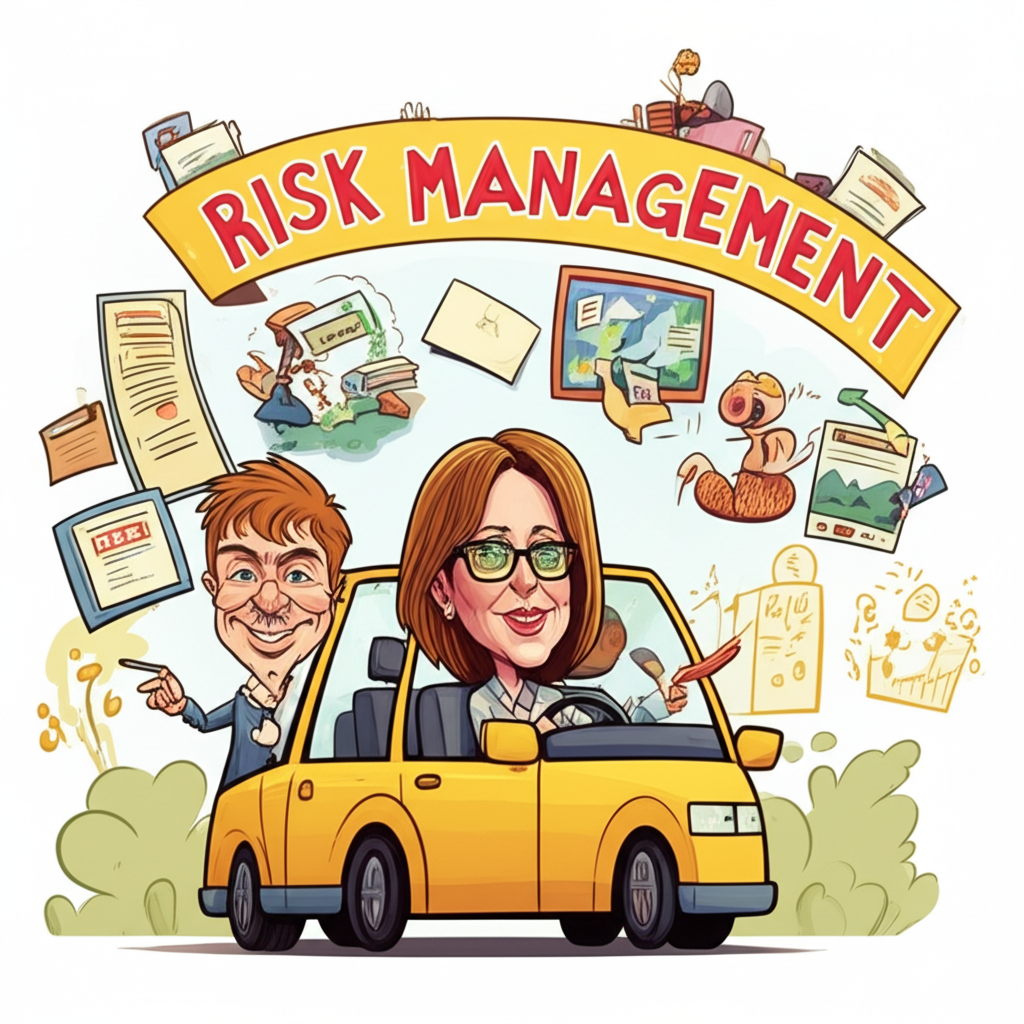
Article 1: The Myth of the Budget: Or, How I Learned to Stop Worrying and Love My Spreadsheet (Eventually)
By Penelope Pennywise, Chief Optimist (and Occasional Spender) at "Money, Honey, Are We There Yet?"
For centuries, humanity has grappled with the concept of the Budget. Whispered in hushed tones in dark corners of the internet, it’s often depicted as a fearsome, soul-crushing beast, guarding the gates to financial freedom with a spreadsheet in one hand and a stern, judging gaze in the other. Legends tell of brave souls who attempted to tame it, only to emerge weeks later, blinking in the sunlight, mumbling about "zero-based" and "sinking funds."
But fear not, dear reader! I am here to tell you that the Budget is not a monster. It’s more like that eccentric, slightly overbearing aunt who constantly asks if you’ve eaten enough, but also secretly slips you a twenty when no one’s looking. Annoying? Sometimes. Ultimately helpful? Surprisingly, yes.
Common Misconceptions About Budgeting:
- "It’s Only for People Who Like Math More Than Puppies." False! While numbers are involved, budgeting is less about calculus and more about common sense. Think of it as a choose-your-own-adventure book for your money. Do you want to go to "Debt Dungeon" or "Vacation Village"? Your choices determine the path.
- "It Means I Can Never Buy Avocado Toast Again." This is perhaps the most egregious lie spread by the anti-budgeting lobby (probably funded by Big Avocado Toast). A budget isn’t about deprivation; it’s about prioritization. You can have your smashed avocado, but maybe it means skipping that fifth artisanal coffee this week. Or, better yet, learning to make it at home and discovering you’re a culinary genius.
- "It Requires the Discipline of a Zen Monk." Look, I once spent an entire afternoon trying to decide between two identical brands of paper towels. Discipline is not my middle name. The trick is to start small. Don’t try to track every single penny like a financial bloodhound on day one. Pick three categories – say, "Food," "Fun," and "Future Self" – and see where your money actually goes. You might be surprised to find your "Fun" category is exclusively funding the local pizza delivery service.
The Shocking Truth: Why Budgeting is Actually Kinda Cool
Here’s the kicker: once you get past the initial "spreadsheet PTSD," budgeting is incredibly empowering. It’s like turning on the lights in a dark room. Suddenly, you see where all your money is hiding, what it’s doing, and who it’s secretly dating (usually Amazon Prime).
- You regain control: No more "where did my money go?" existential crises at the end of the month. You know. You decided.
- You can plan for fun stuff: Want to travel? Buy a new gadget? Support your caffeine addiction? A budget helps you see how to make it happen without resorting to selling a kidney (usually).
- It reduces stress: Believe it or not, knowing where you stand financially is a huge weight off your shoulders. It’s like having a financial GPS telling you, "Recalculating… you are currently heading towards a sensible retirement!"
So, next time you hear the word "budget," don’t run screaming. Approach it with a sense of curious trepidation. Maybe even offer it a metaphorical cup of tea. You might just find that this terrifying beast is actually a fluffy, if slightly demanding, financial companion, eager to help you on your journey to wellness. Just remember to feed it regularly (with data, not actual food).
Article 2: Your Emergency Fund: Taming the Unicorn of Unforeseen Doom
By Dr. Sterling Silver, Head of Paranormal Finance at "The Institute of Fiscal Fantasies"
Ah, the Emergency Fund. For many, it’s a mythical creature, whispered about in hushed tones, glimpsed only by the most financially enlightened. Like a unicorn, it’s often believed to exist only in legends, appearing just when you desperately need it, perhaps to rescue you from a sudden car repair, an unexpected dental bill, or the inexplicable urge to buy a life-sized cardboard cutout of Jeff Goldblum.
But unlike unicorns, emergency funds are real. And they don’t require virgin sacrifices or a magical forest to conjure. Just a little discipline and a healthy dose of paranoia (or, as we like to call it in the industry, "prudent foresight").
Why You Need a Unicorn (and What Happens If You Don’t Have One):
Imagine this: You’re cruising through life, humming a happy tune, when suddenly, a rogue squirrel gnaws through your car’s wiring. Or your fridge decides to spontaneously combust. Or, heaven forbid, your landlord remembers that "minor" leak in the ceiling.
Without an emergency fund, your options are typically:
- The "Credit Card Calamity": Swipe, swipe, swipe! Watch those interest rates climb faster than a squirrel up a particularly well-wired tree.
- The "GoFundMe for a Flat Tire": Humiliating, but effective if your friends are feeling generous (and you’re good at sad puppy dog eyes).
- The "Sell Your Grandma’s Collectible Spoons on eBay": Morally questionable, financially desperate.
- The "Existential Dread Stare": Staring blankly at the wall, questioning all your life choices, possibly leading to a profound philosophical breakthrough (but still no money for the fridge).
An emergency fund, however, acts as your financial superhero. It swoops in, cape billowing, and pays for the crisis, leaving your credit cards pristine and your grandma’s spoons safe. It’s the difference between a minor inconvenience and a full-blown financial meltdown.
How to Conjure Your Own Unicorn Fund (No Magic Required):
Financial gurus often recommend 3-6 months of living expenses. For most of us, that sounds like trying to build a pyramid out of toothpicks. So, let’s start smaller:
- The "Starter Unicorn": Aim for $1,000. This covers most minor car repairs, unexpected medical bills, or that emergency Jeff Goldblum cutout.
- Automate It: Treat your emergency fund like a bill. Set up an automatic transfer from your checking to a separate, unlinked savings account every payday. Out of sight, out of mind, until you need it. Think of it as paying your future self a very important insurance premium.
- Find "Found Money": Did you get a tax refund? A bonus? Sell something on Craigslist that was gathering dust? Don’t blow it on 30 pairs of novelty socks. Send it straight to the Unicorn Fund. It’s like finding a magical pot of gold, only it’s actual money.
- Beware the "Unicorn Poachers": This fund is only for emergencies. A sale on designer shoes is not an emergency. Neither is a sudden craving for a gold-plated toaster. Stay strong!
Building an emergency fund isn’t about being rich; it’s about being prepared. It’s about giving yourself the peace of mind that when life inevitably throws a rogue squirrel (or a rogue toaster) your way, you’ll have a majestic, mythical beast of financial stability ready to catch you. Now go forth and tame your unicorn!
Article 3: The Stock Market: Where Your Money Goes to Party (and Sometimes Cry in a Corner)
By Sir Reginald Fortune-Pudding, Esoteric Investment Guru & Amateur Pigeon Trainer
Ah, the stock market. A mystical realm where fortunes are made and lost, where jargon flows like cheap wine, and where even the most seasoned investors occasionally find themselves muttering, "What fresh hell is this?" For the uninitiated, it’s a bewildering labyrinth of charts, acronyms, and people yelling about "bulls" and "bears" as if they’re running a particularly aggressive zoo.
But fear not, aspiring titans of finance (or those just hoping to afford a slightly nicer retirement home than a cardboard box)! While the stock market can be intimidating, it’s not entirely a casino run by squirrels in tiny top hats. It’s more like a massive, slightly chaotic party where your money gets invited.
Common Investment Delusions (and Why They’ll Make Your Money Cry):
- "I’m Going to Get Rich Quick with That Hot Tip from My Cousin’s Friend’s Barber." Ah, the "hot tip." This is usually followed by "and then I lost everything." If someone has a guaranteed, secret way to get rich, they won’t be sharing it over a haircut. They’ll be on a private island, sipping margaritas with a small, well-behaved unicorn. Investing is a marathon, not a sprint. Unless you’re sprinting away from a bad investment, in which case, sprint like the wind!
- "I Need to Time the Market Perfectly!" This is like trying to catch a greased pig while blindfolded and riding a unicycle. Impossible. Even professional investors struggle with it. Trying to buy at the absolute bottom and sell at the absolute top is a fool’s errand. You’re better off just showing up to the party consistently.
- "Investing is Only for Math Geniuses and People Who Own Yachts." While yacht ownership is a pleasant side effect, you don’t need a PhD in advanced calculus. Basic principles like diversification (don’t put all your eggs in one basket, especially if that basket is made of meme stocks) and long-term thinking are far more valuable than predicting the next market surge.
The (Relatively) Simple Truths About Making Your Money Party Responsibly:
- Start Small, Start Now: You don’t need a king’s ransom to begin. Many platforms allow you to invest with just a few dollars. The power of compounding interest means that even small amounts, invested consistently over time, can grow into a surprisingly large pile of "future you" money. It’s like planting a tiny acorn and watching it slowly become an oak tree that shades your retirement hammock.
- Index Funds & ETFs Are Your Friends: These are like pre-made party mixes. Instead of trying to pick individual stocks (which is like trying to guess which specific canapé will be the most popular), you buy a little bit of everything. They offer diversification without you having to become a stock market sleuth. Boring? Maybe. Effective? Absolutely.
- Ignore the Noise: The financial news cycle is designed to make you panic, buy, and sell. Resist the urge. Unless your house is literally on fire, avoid making drastic decisions based on daily market fluctuations. Your money is at a party, remember? It’s having a good time, possibly dancing awkwardly, but it’s there.
- It’s for the Long Haul: Investing is like planting a garden. You don’t dig up the seeds every day to see if they’ve grown. You plant them, water them, and let them do their thing. The market has its ups and downs, but historically, over the long term, it tends to go up.
So, don’t let the stock market’s fancy suits and confusing lingo scare you away. It’s not about being a financial wizard; it’s about being consistent, patient, and not chasing after every "hot tip" that promises you a private jet by Tuesday. Your money wants to grow, to party responsibly, and to eventually buy you that slightly nicer retirement home. Let it.



Post Comment